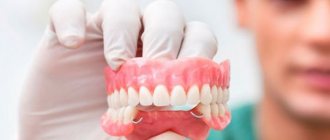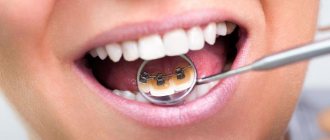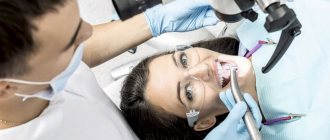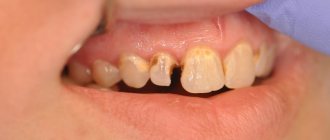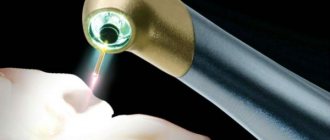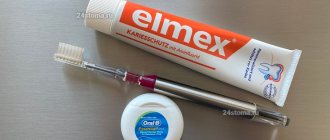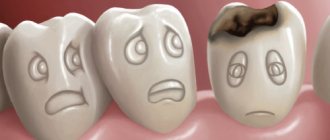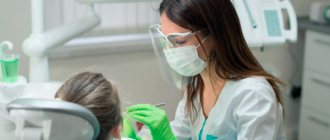What role does a proper diet play in preventing tooth decay?
A healthy, balanced diet is an important factor in the maturation and mineralization of tooth enamel, the prevention of caries and periodontal diseases.
In this article
- What role does a proper diet play in preventing tooth decay?
- How to eat properly to avoid caries?
- What foods can be dangerous for teeth?
- Drinks that increase the risk of tooth decay
- What to eat to prevent caries?
- Other caries prevention measures
The foods we eat affect:
- on the number of bacteria in the oral cavity (the more food rich in quickly digestible carbohydrates and sugars, the more microbes);
- on the amount and composition of saliva, which cleans teeth and naturally neutralizes the effect of bacteria;
- for self-cleaning of teeth and oral cavity (solid food cleanses teeth of food debris and soft plaque);
- on the level of acidity (its increase promotes the active proliferation of bacteria);
- on the general condition of the body and teeth in particular.
Thus, in order to prevent caries, it is necessary not only to maintain oral hygiene and regularly visit the dentist, but also to correct the diet and general nutrition system.
How to prevent dental caries
There are systemic methods for the prevention of caries, affecting the entire body, and local ones, with a localized effect on the oral cavity. Both the first and second can be medicinal or non-medicinal. Thus, methods for preventing caries can be divided into 4 large groups:
Local non-drug prophylaxis
- Individual oral hygiene. First of all, we are talking about brushing your teeth with preventative toothpaste, for example, Colgate® Maximum Protection Against Caries + Sugar Acid Neutralizer. Its formula includes not only fluoride and calcium, but also substances that fight cariogenic acids in dental plaque. In addition, comprehensive hygiene involves using mouthwash after every meal. Colgate® Plax Fruit Fresh contains fluoride to protect against tooth decay and kill up to 99.9% of harmful bacteria. Finally, you should clean the spaces between your teeth with dental floss. Instead of regular floss, use Colgate® Total Fluoride Mint Dental Tape, which has one side coated with sodium fluoride.
- Professional oral hygiene. Even if you brush your teeth thoroughly, some of the deposits in areas of the dentition that are difficult to reach with a toothbrush turn into hard plaque. This occurs due to the accumulation of dental plaque in areas such as proximal surfaces, cervical areas, and chewing surfaces of molars. To get rid of tartar in these areas, you should regularly consult a doctor and remove it using dental equipment. There are several professional cleaning technologies: laser, ultrasonic, compressed air. All of them demonstrate high efficiency [1].
Local drug prophylaxis
- Remineralizing therapy with calcium preparations. For this purpose, rinses, applications, and oral baths can be used. The most effective drug electrophoresis, in which the effect of the drug is enhanced by direct electric current. The method allows you to introduce charged particles into the deep tissues of teeth - dentin and pulp [1].
- Prevention with fluoride preparations. The most commonly used coating is fluoride varnish, the film of which is retained on the tooth surface for a long time and saturates the enamel with fluoride ions. Depending on the specific preparation and the intensity of the carious process, the varnish application procedure is repeated from 2 to 12 times a year [1, 2].
- Fissure sealing. Fissures are natural depressions on the chewing surface of teeth. Due to the difficulty of removing plaque from them and insufficient mineralization, they turn out to be a risk area for caries. To avoid this, the fissures are hermetically sealed with filling materials. Before this, the enamel is etched to improve contact with the sealant and destroy microorganisms. Depending on the technique and retention of the material on the surface, the sealing efficiency is 55–99% [1, 2].
Systemic non-drug prophylaxis
- Proper nutrition. To prevent tooth decay, you should eat as little sweets as possible. At the same time, the main danger is represented by foods that linger in the mouth for a long time, for example, sucking candies. You should not eat foods with a lot of sugar at night and as the last part of the meal. On the contrary, vegetables, fruits, and greens are good for dental health. Sources of calcium are primarily milk and dairy products, as well as beans, nuts, and oatmeal. In order for calcium to be well absorbed, the food must contain phosphorus, which is rich in meat and cereals [1, 3].
Systemic drug prophylaxis
- Fluoridation of drinking water and food. Water with the addition of soluble fluoride salts is supplied through the central water supply system, and, if not possible, given to children in schools. Currently, 5% of the world's population drinks such water. This gives a tangible effect. The increase in caries is reduced by 40–50% for temporary teeth and by 50–60% for permanent teeth. The economic benefits are also great: the cost of fluoridation is 25–50 times less than that of treatment. Milk and table salt are fluoridated from food products in different countries, which also shows excellent results [2].
- Taking medications and vitamin complexes that have a beneficial effect on tooth tissue [1]. First of all, this is sodium fluoride - alone or in combination with vitamins A, C, D. Phosphorus preparations and potassium orotate are also prescribed, which helps fix calcium in tissues.
Preventing caries is easier than treating it: even if the disease is detected at an early stage of the “chalk spot”, there is a chance to stop the destruction process and restore damaged enamel with the help of remineralizing therapy. Therefore, it is so important to use non-drug prevention methods for each person and medicinal ones as prescribed by a dentist, who must undergo examinations at least every six months.
List of sources:
- Boltromyuk G.I. Prevention of dental caries. Toolkit. Irkutsk: IrGUPS MK ZhT, 2016. // URL: https://www.irgups.ru/sites/default/files/mkzht/mp_profilaktika_kariesa.pdf (access date: 10/02/2020).
- Borodovitsina S.I. Prevention of dental diseases: textbook. Ryazan: Federal State Budgetary Educational Institution of Higher Education Ryaz State Medical University of the Ministry of Health of Russia, 2022. // URL: https://rzgmu.ru/images/files/4/9761.pdf (access date: 10/02/2020).
- “A few questions about caries”, interview with Leontyev V.K., MD. // URL: https://dentalcommunity.ru/articles/2291/ (date of access: 03.11.2020).
How to eat properly to avoid caries?
To reduce the risk of dental caries, you need to adjust your diet in accordance with the following recommendations:
- Limit foods that cause caries in your diet, in particular, minimize the consumption of fast carbohydrates and sugars.
- Rinse your mouth or brush your teeth after every meal. For rinsing, you can use water or special solutions.
- You should not eat sweets between main meals, so that sugar does not remain on your teeth - a breeding ground for microbes.
- Add more solid and fibrous foods (fresh vegetables, fruits) to your diet, which will cleanse the enamel of soft plaque and remove food debris.
- Eat food at a comfortable temperature (neither hot nor cold).
- There are foods high in fluoride, calcium, phosphorus, and vitamin D that are good for teeth.
- Chew food well and for a long time, because chewing produces saliva, which has a bactericidal effect and destroys the cell walls of bacteria.
Expert advice and recommendations
- To more effectively remove sticky and sugary food residues, use fluoride rinses.
- It is worth limiting the consumption of foods high in sugar. Candies and donuts can be replaced with fruit.
- To prevent caries, it is important that teeth brushing occurs immediately after eating.
- It is extremely undesirable to eat foods that contrast in temperature, as this negatively affects the condition of the enamel and contributes to the occurrence of microcracks.
What foods can be dangerous for teeth?
- Food that is too hot or too cold weakens tooth enamel and causes microcracks to appear on it, into which cariogenic microbes easily penetrate.
- Sweet foods are an ideal breeding ground for bacteria. Microbes convert the sugars contained in sweets into acids that destroy enamel and dentin, causing caries. In addition, some sweets (for example, caramel, toffee, candy bars) stick to the teeth, get stuck in hard-to-reach places and remain in the mouth for a long time, exacerbating the proliferation of microbes.
- Acidic foods. Although citrus fruits are very beneficial for our immunity, in large quantities they can be dangerous for tooth enamel due to the acid they contain. Also, due to the high acid content, store-bought sauces, ketchups, and pickled foods can be dangerous for teeth. To prevent dental caries, it is recommended to rinse your mouth with clean water immediately after eating acidic foods.
- Fruits and berries in large quantities, as modern research shows, can also increase the risk of developing caries. It turns out that modern fruits contain much more sugar than just a few decades ago. Therefore, it is recommended to eat them in moderation.
- Unpeeled seeds and nuts wear away tooth enamel and contribute to the appearance of chips on the surface of teeth, which increases the risk of developing caries.
- Alcohol, chips, and crackers contribute to a prolonged feeling of dry mouth and reduce salivation. But saliva naturally cleanses teeth of food debris and has an antimicrobial effect.
Drinks that increase the risk of tooth decay
- Sodas like Coca-Cola stain the surface of tooth enamel and destroy bone tissue in the body.
- Tea helps wash out calcium and stains teeth, while coffee also promotes the growth of bacteria in the oral cavity.
- Energy drinks destroy tooth enamel due to large amounts of acids.
- Store-bought fruit juices contain large amounts of sugar.
You don’t have to completely give up all drinks, but you need to follow safety precautions when drinking them. For example, drink juices or tea through a straw to minimize contact with teeth.
What to eat to prevent caries?
Not only limited consumption of foods that are harmful to dental health helps reduce the risk of developing caries, but also, on the contrary, the introduction of foods that are rich in beneficial microelements into the diet. Fluoride, calcium and phosphorus play a vital role in caries prevention.
Fluoride strengthens tooth enamel, prevents the proliferation of pathogenic microflora, and in childhood plays a decisive role in the proper formation of teeth. Food sources of fluoride are black and green tea, mineral water, garlic, fish, walnuts, parsley, and seafood.
Calcium is the main building material of teeth; it strengthens and restores tooth enamel, protects it from the destructive effects of acid produced by bacteria. If you want to have healthy teeth without caries, your diet should include dairy products, eggs, herbs, nuts, and green vegetables. Vitamin D is necessary for the absorption of calcium. Therefore, along with calcium-containing foods, the diet should include foods containing this vitamin: fish oil, egg yolk, cod liver, tuna, butter.
Phosphorus promotes normal tooth growth and maintains healthy enamel. Buckwheat, fish, oatmeal, beans, and red meat are rich in phosphorus.
Diet against caries
A complete diet includes 5 main components: proteins, fats, carbohydrates, vitamins and minerals. The most important for dental health are calcium, fluoride and vitamin D.
Fluorine
The optimal dosage of fluoride per day is 2-3 mg, while a large amount of the mineral enters the body with drinking water. Many cities specifically carry out fluoridation of water. Fluorine, together with calcium and phosphorus, takes an active part in the formation of bone tissue and tooth enamel.
However, it should be remembered that an increased fluoride content is fraught with the development of fluorosis. This is a chronic disease that causes a “mottled enamel” effect.
Calcium
Calcium is the main building material for teeth and bones. The daily calcium requirement for an adult is 800-900 mg. However, this element is absorbed only with a sufficient amount of vitamin D.
Vitamin D
Vitamin D is produced by the body when exposed to sunlight. But residents of northern regions, where there are few sunny days, are recommended to take dietary supplements with vitamin D; its daily requirement for an adult is 5 mcg.
Other caries prevention measures
A healthy and balanced diet is of great importance in preventing the development of dental caries. However, you should not expect that giving up some foods and eating others can completely get rid of dental caries. An integrated approach is important in the fight against cariogenic bacteria and the prevention of caries. After adjusting your diet, also pay attention to the following points:
- Brush your teeth regularly with a properly selected brush and paste, use floss, dental floss or irrigators to remove food debris from hard-to-reach areas and interdental spaces.
- Visit your dentist twice a year for preventative purposes, even if you have no symptoms of caries and no signs of oral discomfort.
- When caries appears, treat it at an early stage, without delaying the process to a deep stage or pulpitis.
- Regularly visit a hygienist for professional teeth cleaning - special equipment will help remove complex plaque from the surface of the teeth, which is difficult to remove with manual brushing.
Compliance with these simple preventive measures plus nutritional correction towards a healthy and balanced diet will allow you to maintain healthy teeth for a long time and prevent the development of caries.
Prevention of caries development in children and adults
According to official statistics from the World Health Organization, almost 100% of the world's population has dental caries. Modern dentistry offers effective methods for treating this disease, but prevention plays the most important role in preventing caries.
In what cases does dental caries develop: risk factors
The condition of teeth is one of the main indicators of the overall health of the human body. Therefore, preventive measures aimed at reducing the risk of caries development are an important element of comprehensive health improvement. To protect teeth from carious lesions, it is necessary to understand what contributes to the development of the disease.
There are three main risk factors: dental plaque and the microbes it contains; increased amount of sugar in food; lack of fluoride in food and water. In addition to these main factors in the development of caries, to varying degrees, the risk of pathology may depend on the level of solar radiation, gender and age, climatic and geographical living conditions. The likelihood of illness increases with pathological pregnancies, systemic and acute infectious diseases, during radiotherapy and other influences that weaken the immune system. An important risk factor is insufficient or improper dental and oral hygiene.
Comprehensive prevention of caries in adults involves influencing the main risk factors using different methods. Thanks to such preventive measures, it is possible to eliminate or reduce the risk of developing dental caries.
Prevention of dental caries: primary, secondary and tertiary
In modern dentistry, there are three important stages of caries prevention. Primary prevention helps prevent the development of dental caries. It involves performing procedures that eliminate the factors and causes that provoke the disease. Secondary allows you to detect the disease at an early stage and take measures that will stop its development and prevent its reappearance. Tertiary is a set of measures after the main treatment. It can be aimed at restoring dentition, chewing function, or the lost appearance of teeth.
Methods of primary prevention of caries
They are divided into endogenous (impact on internal factors) and exogenous (impact directly on the tooth surface). Endogenous preventive measures include: a complete, balanced, varied diet; activities aimed at strengthening the immune system; elimination of stress factors; taking vitamin and mineral supplements and saturating the body with fluoride, calcium and other microelements necessary for dental health. Exogenous prevention of caries is: daily brushing of teeth using a good toothbrush, paste and floss; professional cleaning by a dentist twice a year; treatment of tooth enamel with preparations containing fluoride; limited consumption of sweets and other foods rich in carbohydrates; use of chewing gum; sealing fissures (natural pits and grooves) on children's teeth. Comprehensive caries prevention measures help reduce the likelihood of its occurrence several times.
The role of nutrition in preventing dental caries
One of the effective measures to combat caries is the correct approach to nutrition. The tissues of the oral cavity are sensitive to the lack of certain food components. In particular, a lack of protein in the diet prevents the accumulation of calcium and disrupts the structure and strength of enamel. At the same time, foods that are too fatty increase the permeability of the enamel, which increases the likelihood of the formation of carious lesions.
An excess of refined carbohydrates (sweets, flour products, sugar) in the diet not only reduces the resistance of teeth to the development of caries, but also weakens the immune defense, which is also a risk factor. To prevent caries, it is important to adhere to the following nutritional recommendations: a sufficient amount of protein must be present in the daily diet; eat foods containing vitamins C, D and group B; be sure to eat foods rich in calcium and phosphorus (milk, cheese, eggs, fish, broccoli, legumes), as well as fluoride-containing foods (sea fish, Georgian tea); it is necessary to limit the consumption of foods rich in “fast” carbohydrates, eat as little sweets, cakes and refined sugar as possible; Avoid sticky products: they can remain on the surface of tooth enamel for up to an hour, contributing to its demineralization for a long time.
The nature of your diet directly affects the condition of your teeth. A rational, fortified, balanced diet is an effective method of non-drug prevention of caries.
How to reduce the adverse effects of carbohydrates on teeth
Fermentation of carbohydrates under the influence of microbes leads to the production of organic acid, which destroys tooth enamel and contributes to the development of caries. It is impossible to completely stop eating carbohydrates, but it is quite possible to reduce the intensity of their influence on the development of caries. The following measures will help with this: Reducing the amount and, most importantly, the frequency of eating carbohydrate foods, so that the teeth come into contact with carbohydrates as little as possible. In some cases, your doctor may recommend switching from sugar to sweetener substitutes. Reducing the time carbohydrates spend in the mouth. This can be achieved in two ways: do not eat the sweet dish last, and be sure to rinse your mouth after eating. Avoid eating sweets at night and between meals.
If any of the recommendations are violated, to reduce the risk of caries, you need to brush your teeth and rinse your mouth.
Strengthening the immune system and reducing stress factors as methods for preventing dental caries
The most important task of the immune system is to resist the effects of microbes. If the body's defenses are weakened (including under the influence of stress), the immune system cannot resist harmful bacteria. That is why, against the background of severe stress and weakened immunity, the risk of dental caries increases.
Prevention consists of strengthening the immune system, for which the following measures are suitable: quality sleep for at least 8 hours; physical activity: daily exercise, sports; hardening: water treatments, sun and air baths, cool air in the apartment; avoidance of stressful situations; refusal or limitation of bad habits (smoking, alcohol); adherence to daily routine; if necessary and only as prescribed by a doctor, medications to strengthen the immune system.
Drug prophylaxis
After an in-person examination, the dentist, according to indications, can prescribe to the patient one of the following methods of medicinal endogenous prevention: additional fluoridation of food and drinking water (the amount of fluoride is calculated only by the doctor, taking into account the dose that the person already receives from food and water); anti-caries drugs for oral administration (usually they contain a complex of vitamins and sodium fluoride that help strengthen teeth).
There are also exogenous methods of drug prophylaxis. These include coating the teeth with fluoride varnish or fluoride gel. Fluoride varnish stays on the enamel surface for a long time, saturates it with fluoride ions, has an antimicrobial effect, and reduces pain in cases of increased tooth sensitivity. Fluoride-containing gel has a remineralizing effect on tooth enamel; it is used for applications or electrophoresis.
Sealing dental fissures as caries prevention
Fissures are natural depressions on the surface of teeth. Food debris accumulates in these pits, making it more difficult to remove plaque and germs from there during cleaning. In addition, in the fissure area, enamel mineralization is slowed down; its layer is thinner than on other surfaces of the teeth, so natural depressions are considered a risk zone for the development of carious lesions. The fissure sealing method is primarily used for children. Its essence lies in the fact that the recesses are closed with special sealants. As a result, food does not accumulate on the teeth, and the vulnerable spot of the tooth surface is reliably protected from the action of pathological microorganisms.
Personal oral hygiene as protection against caries
Individual oral hygiene plays an important role in preventing caries. It refers to exogenous non-drug methods of prevention.
Regular brushing of teeth, tongue, removal of food debris, soft deposits contributes to the proper development and functioning of tooth enamel. The components of therapeutic and prophylactic pastes enrich the tissues of the oral cavity with calcium and phosphate salts, vitamins and microelements, making them more resistant to negative influences. Massaging the gums with a toothbrush activates metabolism, improves blood circulation in periodontal tissues, and prevents bleeding and gum disease. Personal hygiene involves careful independent removal of plaque from the surface of teeth and gums using toothbrushes, pastes and other products. The effectiveness of individual oral hygiene depends on several factors: the quality and compliance of the characteristics of the toothbrush with the condition of the teeth of a particular patient; following proper cleaning techniques; the use of additional cleansing methods - irrigators, dental floss, mono-beam and orthodontic brushes, rinses.
How to brush your teeth correctly to avoid caries?
The toothbrush should have a small head to easily penetrate hard-to-reach areas of the oral cavity, removing plaque even from distant teeth and from interdental spaces. The stiffness of the bristles is of great importance. The best choice for most adult users is a medium-hard brush. It will clean the surface of the teeth quite intensively, without damaging the gums or scratching the enamel.
However, for children and those with sensitive teeth and gums, brushes with soft bristles are needed. Regarding the correct choice of the optimal toothbrush, as well as toothpaste with the appropriate composition, it is better to consult with your dentist. He will be able to make recommendations based on an in-person examination of the oral cavity.
Even a properly selected brush and good toothpaste will not protect against caries if you brush your teeth incorrectly. Therefore, it is important to learn a technique that will allow you to most effectively clean your teeth and oral cavity from bacteria. There are several different ways to clean teeth in dentistry. One of the most widespread is the standard Pakhomov method: The dentition is conventionally divided into segments. Begin cleaning from the upper right segment, from the distant chewing teeth. They alternately move from segment to segment along the upper jaw, and then move on to cleaning the lower row of teeth in a similar way. According to Pakhomov’s method, when cleaning the lateral front and back surfaces of the teeth, the brush moves in the direction from the gums to the edge of the tooth. Chewing surfaces are cleaned with back-and-forth movements. Finish cleaning with circular movements in each segment.
Please note that this cleaning method is suitable for those who use regular manual toothbrushes. There are nuances in using electric toothbrushes, and the method of using them is always detailed in the instructions. The main difference is that an electric toothbrush does not require mechanical movements; it simply needs to be moved from tooth to tooth without applying too much pressure.
After brushing your teeth with a brush and toothpaste, it is recommended to additionally clean the interdental spaces with floss or irrigator, and also use the mouthwash as a solution for the prevention of caries.
Chewing gums as caries prevention
Chewing gum may help prevent tooth decay by increasing saliva production. Salivary fluid washes each tooth, removing dirt and germs from it, has an antiseptic effect on the oral cavity, and neutralizes plaque acids. For preventive purposes, it is recommended to chew gum with sweeteners for several minutes after each meal, especially sweets. Remember that comprehensive preventive measures will help maintain the health and appearance of your teeth for a long time. Sources: e-stomatology.ru, novstom21.med.cap.ru, sp1-tmn.ru, dentart.org rzgmu.ru, ochkov.net
